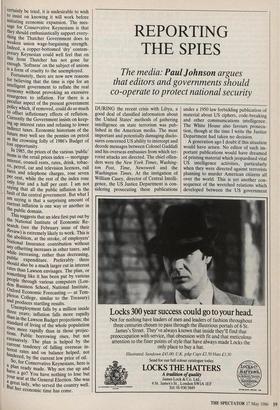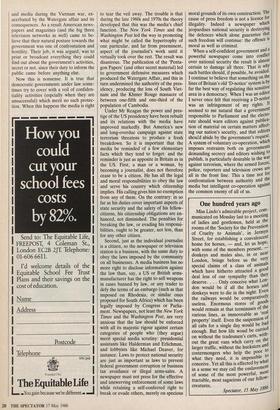REPORTING THE SPIES
that editors and governments should co-operate to protect national security
DURING the recent crisis with Libya, a good deal of classified information about the United States' methods of gathering intelligence on state terrorism was pub- lished in the American media. The most important and potentially damaging disclo- sures concerned US ability to intercept and decode messages between Colonel Gaddafi and his overseas embassies from which ter- rorist attacks are directed. The chief offen- ders were the New York Times, Washing- ton Post, Time, Newsweek and the Washington Times. At the instigation of William Casey, director of Central Intelli- gence, the US Justice Department is con- sidering prosecuting these publications under a 1950 law forbidding publication of material about US ciphers, code-breaking and other communications intelligence. The White House also favours prosecu- tion, though at the time I write the Justice Department had taken no decision.
A generation ago I doubt if this situation would have arisen. No editor of such im- portant publications would have dreamed of printing material which jeopardised vital US intelligence activities, particularly when they were directed against terrorists planning to murder American citizens all over the world. This is yet another con- sequence of the wretched relations which developed between the US government
and media during the Vietnam war, ex- acerbated by the Watergate affair and its consequences. As a result American news- papers and magazines (and the big three television networks as well) came to be- lieve that their natural posture towards the government was one of confrontation and hostility. Their job, it was argued, was to print or broadcast everything they could find out about the government's activities, secret or not, since their duty to inform the public came before anything else.
Now this is nonsense. It is true that democratic governments under law some- times try to cover with a veil of confiden- tiality activities (espcially when they are unsuccessful) which merit no such protec- tion. When this happens the media is right
to tear the veil away. The trouble is that during the late 1960s and 1970s the theory developed that this was the media's chief function. The New York Times and the Washington Post led the way in promoting what might be called the hypertrophy of one particular, and far from preeminent, aspect of the journalist's work until it virtually took over the rest. The result was disastrous. The publication of the 'Penta- gon Papers' (and other secret material) led to government defensive measures which produced the Watergate Affair, and this in turn undermined the authority of the pres- idency, producing the loss of South Viet- nam and the Khmer Rouge massacre of between one-fifth and one-third of the population of Cambodia.
Under Mr Reagan the power and pres- tige of the US presidency have been rebuilt and its relations with the media have improved markedly. But America's new and long-overdue campaign against state terrorism threatens to produce a fresh breakdown. So it is important that the media be reminded of a few elementary facts which they tend to forget: and the reminder is just as apposite in Britain as in the US. First, a man or a woman, by becoming a journalist, does not therefore cease to be a citizen. He has all the legal and moral responsibilities to obey the law and serve his country which citizenship implies. His calling gives him no exemption from any of them. On the contrary: in so far as his duties cover important aspects of state security and the safety of his fellow- citizens, his citizenship obligations are en- hanced, not diminished. The penalties for breaking the law, or evading his responsi- bilities, ought to be greater, not less, than for any other citizen.
Second, just as the individual journalist is a citizen, so the newspaper or television station is a business, with the same duty to obey the laws imposed by the community on all businesses. A media business has no more right to disclose information against the law than, say, a US or British arms- manufacturer has the right to sell weapons in cases banned by law, or any trader to defy the terms of an embargo (such as that imposed on Rhodesia, or similar ones proposed for South Africa) which has been legally imposed by Congress or Parlia- ment. Newspapers, not least the New York Times and the Washington Post, are very anxious that the law should be enforced with all its majestic rigour against certain categories of people who (they argue) merit special media scrutiny: presidential assistants like Halderman and Erlichman, and lobbyists like Michael Deaver, for instance. Laws to protect national security are just as important as laws to prevent federal government corruption or business tax avoidance or illegal arms-sales. A newspaper must not press for the effective and unswerving enforcement of some laws while retaining a self-conferred right to break or evade others, merely on specious
moral grounds of its own construction. The cause of press freedom is not a licence for illegality. Indeed a newspaper which jeopardises national security is destroying the defences which alone guarantee that such freedom will continue: the offence is moral as well as criminal.
When a self-confident government and a powerful newspaper come into conflict over national security the result is almost certain to damage all three. That is why such battles should, if possible, be avoided. I continue to believe that something on the lines of Britain's old 'D-notice' system is by far the best way of regulating this sensitive area in a democracy. When I was an editor I never once felt that receiving a D-notice was an infringement of my rights. It seemed to me natural that a government responsible to Parliament and the electo- rate should warn editors against publica- tion of material on certain matters affect- ing our nation's security, and that editors should abide by the government's request. A system of voluntary co-operation, which imposes restraints both on governments demanding secrecy and editors wishing to publish, is particularly desirable in the war against terrorism, where the armed forces, police, reporters and television crews are all in the front line. This a time not for confrontation between authority and the media but intelligent co-operation against the common enemy of all of us.



















































 Previous page
Previous page